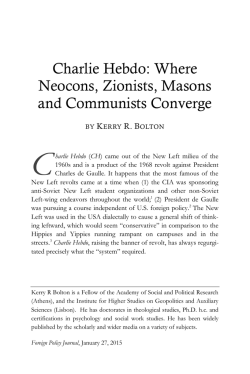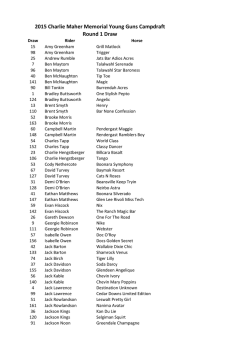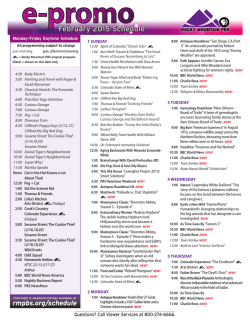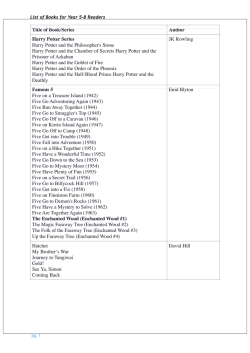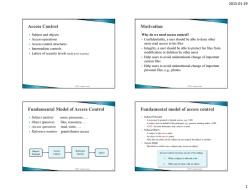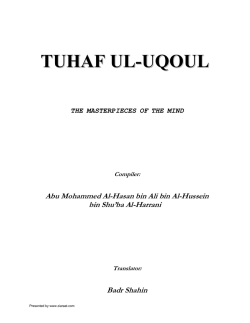
Tariq Ali Charlie Hebdo and the Muslim Response
! LATEST Vol. 37 No. 3 · 5 February 2015 page 12 | 2109 words facebook 654twitter 155share email letter cite print larger | smaller ‘It didn’t need to be done’ Tariq Ali on ‘Charlie Hebdo’ In the week following the atrocities, a wave of moral hysteria swept France. ‘Je suis Charlie’ became almost obligatory. The Hollande/Valls message was simple: either you were for the magazine or for the terrorists. Quite a few, now as in 2001, were for neither. These included Henri Roussel, the 80-yearold founder of Hara-Kiri, the title under which Charlie Hebdo was published before it was forced into a name change – it was banned by the French government for insulting the corpse of Charles de Gaulle. In a remarkable essay published in the Nouvel Observateur Roussel made two essential points. The first concerned French foreign policy: I don’t much like it when a head of state speaks of the dead as heroes. It usually happens because citizens have been sent to war and not come back, which is rather the case with the victims of the attack on Charlie Hebdo. The attack is part of a war declared on France, but can also be seen in the light of the wars France has got itself involved in: conflicts where its participation isn’t called for, where worse massacres than that at Charlie Hebdo take place every day, several times a day, where our bombardments pile death on death in the hope of saving potentates who feel threatened and are no better than those who threaten them … If Obama had not held Hollande back, he would have gone after Assad in Syria, just as Sarkozy went after Gaddafi in Libya … with the result we’re familiar with. The second was personal. Roussel knew all the victims well and this made him both angry and sorrowful. He denounced Charb for his recklessness: He was the boss. Why did he need to drag the whole team into it? In the first attack on Charlie Hebdo in November 2011, the offices were torched after an issue was called ‘Charia Hebdo’. I quote what I said … in the Obs: ‘I think we’re ignorant and imbeciles who have taken a pointless risk. That’s all. We think we’re invulnerable. For years, decades even, we do provocative things and then one day the provocation comes back at us. It didn’t need to be done.’ It didn’t need to be done, but Charb did it again. A year later, in September 2012, after a provocation that put France’s ambassadors in Muslim countries in a state of siege … I asked Charb in the pages of the Obs: ‘To show, with the caption “Muhammed: A Star is Born”, a naked Muhammed praying, seen from behind, balls dangling and prick dripping, in black and white but with a yellow star on his anus – whatever way you look at it, how is this funny?’ I was sick of it. Charb told a journalist from Le Monde: ‘I have no kids, no wife, I prefer to die on my feet than to live on my knees.’ Cavanna, who feared death, wrote when he was Charb’s age: ‘Rather red than dead.’ * The reds are no longer red, the dead are still dead. Everyone has seen Charb’s last cartoon: ‘Still no attacks in France?’ And the jihadist in the cartoon, armed like the one who killed Charb, Tignous, Cabu, Honoré and the others, replies: ‘Wait! We’ve got until the end of January for New Year’s greetings …’ Have you seen Wolinski’s last cartoon? It ends: ‘I dream of returning to Cuba to drink rum, smoke a cigar and dance with the beautiful Cuban girls.’ Charb who preferred to die and Wolin who preferred to live. I blame you, Charb. Peace on your soul. Roussel’s was a lonely voice and in response to complaints, including one from the publisher of Charlie Hebdo, the editor of Nouvel Observateur replied that after serious discussion it had been agreed that freedom of speech was best preserved by not denying it to those who disagreed with the mainstream narrative. Elsewhere three publishers who refused to display ‘Je suis Charlie’ on their websites were subjected to persistent questioning and bullying. It was reminiscent of the post 9/11 mood in this country (remember Mary Beard?), leave alone the States. And what of the huge Sunday crowd convened by the president at the place de la République? The photo-op brigade at the front turned into a disaster when Netanyahu, waving triumphantly to onlookers, crashed his way to the front. The dignitaries he was so keen to join weren’t all that impressive: the puppet president of Mali; Angela Merkel, the Mother of Europe (her hands held in a way that suggested a mysterious Masonic signal); Donald Tusk, the Polish president of the Council of Europe. And, hurriedly summoned at the last minute to balance the presence of the Israeli leader, there was Mahmoud Abbas, the PLO leader, holding hands with the king of Jordan (both are Israeli supplicants). Sarkozy, placed in the fourth row, quickly began his own long march to the front, but by the time he got there the cameras had disappeared and the celebs soon followed suit. How many turned up in all? A million was the official figure. Eric Hazan, the waspish historian of Paris, used different criteria: It was as big as the one on 28 April 1944, when Marshal Pétain attended the funeral service for the victims of Allied bombings at the Hôtel de Ville. War fever apart (the shouts of ‘To Berlin!’ in 1914), the great moments of unanimity have taken place at public funerals – like those of Victor Hugo, Pierre Overney, Jean-Paul Sartre, or Edith Piaf. Sunday’s demonstration is of the same order, the crowd is moved by sentiment and satisfied by coming together to express a vague desire for unity and reconciliation. As if the strength of the crowd was enough to mitigate the lack of a society that takes our common well-being as its goal. Slowly, a more critical France is beginning to speak up. An opinion poll two days after the big march revealed a divided country: 57 per cent were ‘Je suis Charlie’s, but 42 per cent were opposed to hurting the feelings of minorities. Some of the latter might have been thinking of the blanket publicity for Michel Houellebecq and his new novel, Soumission, on TV and in print in the week preceding the attack on the magazine. Those with longer memories might have recalled Houellebecq’s statement in 2001, which laid the basis for the title of his latest offering: ‘Reading the Quran is a disgusting experience. Ever since Islam’s birth it has been distinguished by its desire to make the world submit to itself. Submission is its very nature.’ Replace the Quran with the Old Testament and Islam with Judaism and you would be locked up in France today, as some have been, including a 16-year-old schoolboy who parodied Charlie Hebdo. A satirical magazine, it appears, cannot be satirised. The double standards prevailing in France were made clear yet again when the Jewish Defence League, modelled on its US counterpart, was allowed to organise a demonstration under a banner – IMMIGRATION: REFERENDUM – which aligned it firmly with the extreme right in France and the rest of Europe. In the Muslim world responses were varied. Even as Niger’s president, Mahamadou Issoufou, was marching in Paris, 45 Christian churches in his country were being torched and pastors’ homes targeted – the Boko Haram leader, Abubakar Shekau, was born in Niger and is an influential presence there, if only on video. Public funerals for the slain terrorists were held in Pakistan and Turkey (even though Islam expressly forbids funerals without a body). Two distinct narratives competed in Turkey. The president and his prime minister, just back from the Paris march, entered the realm of conspiracy satire by implying that the terrorist attack had been carried out by the French themselves, possibly aided by Mossad. The mayor of Istanbul backed them. These are Nato’s favourite Islamists and we can only speculate as to whether the leash will be shortened soon. The Turkish republican followers of Kemal Atatürk supported Charlie Hebdo unconditionally. Their daily paper, Cumhuriyet, published four pages from the new issue of Charlie Hebdo as an insert, but not the cover or drawings portraying the Prophet Muhammed. However two columnists on the paper reproduced the cover beside their pieces, enraging the government and its followers. Vans carrying the paper to distribution outlets were seized and Erdoğan also used the crisis as an excuse to crack down on local dissidents who had been rubbishing him on various websites. Elsewhere the Sunni-Shia divide was highlighted when Sayyid Hassan Nasrallah, the leader of Hizbullah, used a TV address marking the anniversary of the prophet’s birth to denounce extremists within Islam (takfiris) who behead and slaughter their captives, claiming that their actions were much more dangerous for Islam than for anyone else. He had no such compunctions when the Ayatollah Khomeini pronounced a fatwa sentencing Salman Rushdie to death, and was still going on about it in 2006 on al- Jazeera. ‘If the faithful had carried out Ayatollah Khomeini’s injunction and killed the apostate Rushdie,’ he said on that occasion, ‘the Danish newspaper editor would never have dared to publish these cartoons.’ A naive view, but times have changed and the battle with Sunni extremism is now at its peak. On the question of images there has always been a debate within Islam. The Quran itself contains warnings against the worship of idols and graven images, but this is taken straight from the Abrahamic tradition and the Old Testament. It’s a stricture on forms of worship. After all, images of the prophet were embossed on early Muslim coins to replace Byzantine and Persian potentates. A number of paintings by Muslim artists in the late medieval period depict the prophet with loving care. The Shia tradition has always ignored the supposed ban on images and portraits of Shia imams have never been forbidden. All the different schools of Sunni jurisprudence don’t agree on the question. It has only become a big issue since Saudi money pushed Wahhabi clerics onto the world stage to fight communism during the Cold War (with the total backing of Washington). Wahhabi literalism misinterprets the Quran and its hostility to images led the Saudi government to destroy the graves in Mecca of the prophet, his companions and his wives. There were no protests except by architects and historians who denounced the vandalism. One can only imagine the response in the world of Islam had the destruction of the graves been carried out, deliberately or accidentally, by a Western power. We now know that the assault on Charlie Hebdo was the outcome of intraWahhabi rivalry. The attack has been claimed by Ayman al-Zawahiri as an alQaida initiative, organised by its section in the Yemen. There is no reason to doubt his assertion. His organisation has been outflanked and partially displaced by the Islamic State and a global act of terror was needed to restore its place as the leading terror group. As in other suicide-terrorism outings by al-Qaida, the act itself was well planned and predictably successful, and those who carried it out were duly sacrificed. Al-Qaida’s supporters will now boast that while their rivals kill other Muslims and accept Western largesse, they alone target the West and inflict damage. The fact that all these acts are inimical to the interests of European or American Muslims and benefit only the West seems to escape their attention. David Cameron and other Western leaders insist, as they do after every outrage, that the problem is radicalised Islam and therefore the responsibility lies within the religion. (Why was Catholicism never blamed for the IRA offensives?) The real problem is not a secret: Western intelligence services regularly tell their leaders that the radicalisation of a tiny sliver of young Muslims (more work for the security services in Britain and France than for al-Qaida or ISIS) is a result of US foreign policy over the last decade and a half. Some of these Muslims have been happy to acquire new skills and priorities while fighting in Bosnia and, more recently, Syria.
© Copyright 2026
